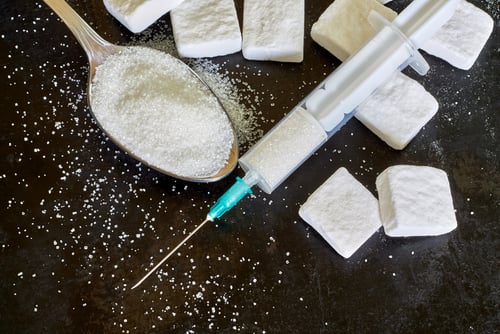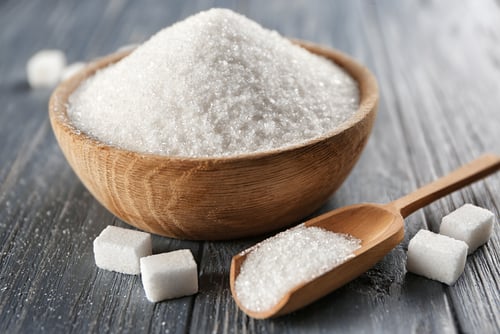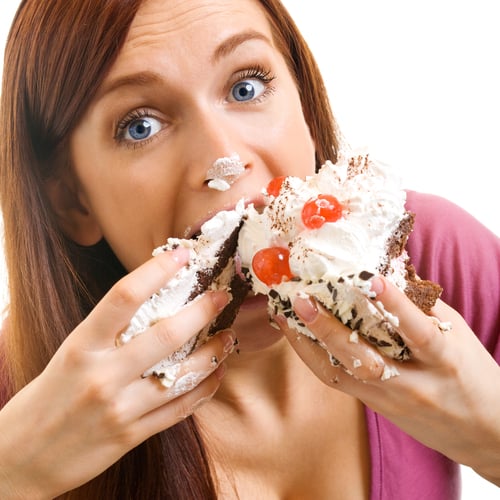
THE HEALTH RISKS OF CONSUMING EXCESSIVE SUGAR
If you’re passing on cake, ice cream, or other sweets trying to avoid sugar, pat yourself on your back for your effort and restraint. Researchers at the National Institute on Drug Abuse tell us that sugar could be as addictive as alcohol and street drugs and that it has a similar effect on our brains.
Some research shows that sugar can be even more addictive than cocaine claims James DiNicolantonio a cardiovascular researcher. “You get this intense release of dopamine upon acute ingestion of sugar. After you chronically consume it, those dopamine receptors start becoming down-regulated — there’s less of them, and they’re less responsive… but it can also lead to a mild state of depression because we know that dopamine is that reward neurotransmitter.”1

Researchers do not entirely agree on whether sugar produces the same intensity of addiction that substances like heroin, cocaine, cigarettes, and alcohol do. But researchers do agree that sugar can cause severe health problems. Sugar elevates the risk of diabetes, obesity, fatty liver disease, cardiovascular disease, and dementia. Research also shows that too much sugar consumption can cause cancer by promoting tumor growth.2
Unfortunately, you’re very likely eating way more sugar than you realize. The American Heart Association states we Americans unknowingly eat 17 teaspoons of added sugar every day while the recommended amount is no more than six teaspoons for women and nine teaspoons for men.3 The culprits include sugary beverages, eating out, and processed foods. The truth is, most of us are entirely unaware of the amount of sugar we consume daily.
THE EFFECTS OF SUGAR ADDICTION

Addiction is compulsive substance usage without regard for the adverse consequences. Sugar consumption causes a rush of the chemical dopamine to the brain, releasing a feeling of intense pleasure.4 Dopamine is a neurotransmitter in the brain’s learning, memory, and reward system that’s associated with addictive behavior. Sugar can lead to cravings that make it difficult to stop.
Certain signs indicate you may be addicted to sugar:
- Intense cravings and feelings of loss of control
- Eating large amounts despite it causing problems, such as weight gain, tooth decay, and health concerns like elevated blood sugar levels.
- Hiding the volume of your sugar consumption from others.
If you suspect you’re addicted to sugar, take steps now to reduce your sugar intake. Willpower alone may not be enough to curb your sugar habit, just as it isn’t enough to end dangerous addictions to cigarettes and drugs.
Here are a few practical strategies that may help you get control of your sugar cravings and keep your consumption within a healthy range.

Your taste buds need retraining. Who doesn’t enjoy a few teaspoons of sugar in their coffee or tea? If you add extra sugar to your food or drinks, try gradually reducing the amount each day over a couple of weeks. The gradual decrease will help retrain your taste buds so you can enjoy your favorite coffee without the extra sugar or at least with far less sugar than you are currently using.
Small changes to your lifestyle add up. Replace a little sugar each week with something healthy and delicious. If you eat ice cream every night before you go to bed, make it every other night and replace it with healthier low sugar yogurt, a fruit smoothie or fruit salad. After a few weeks, your taste buds and brain will adapt to the lower sugar levels.

Replace sugar with fruit. Reach for a piece of fruit the next time you have a sugar craving. The natural sweetness in berries, grapes, or a banana will satisfy your sweet tooth while simultaneously providing you with nutrients and fiber to help your body pass the fruit’s natural sugar.
More protein. High protein foods help reduce your cravings for sugar because they digest more slowly, so you feel fuller and less hungry. A piece of cheese, almonds, or an egg are excellent replacements when you crave sugar.

Move your body. Exercise is a healthy lifestyle habit that reduces your sugar cravings. Thirty minutes of exercise every day will help you choose a healthy snack over a bowl of ice cream.
Consult a professional. If you binge on sugar when you’re upset or stressed out, or if you eat excessive amounts regularly, consider talking to a therapist. Emotional eating is a common problem and dealing with the issues that underlie it may help end your sugar addiction. And imagine how the overall quality of your life will improve!
Probiotics to the rescue. Beneficial bacteria in your digestive tract have substantial positive effects on your brain, immunity system, and digestive health. Recent research published in the Journal of Scientific Reports maintains healthy gut bacteria help mitigate sugar cravings.5 One of the best ways to encourage healthful gut bacteria is to take a daily probiotic. You can reduce digestive problems that excessive sugar consumption causes like gas, diarrhea, bloating, and constipation.
Citations:
- “Is Sugar More Addictive Than Cocaine?” Wbur.Org. http://www.wbur.org/hereandnow/2015/01/07/sugar-health-research.
- “Insulin And Cancer – D. Barry Boyd, 2003”. 2019. Integrative Cancer Therapies. https://journals.sagepub.com/doi/10.1177/1534735403259152.
- “How Much Is Too Much?”. 2014. Sugarscience.UCSF.Edu. http://sugarscience.ucsf.edu/the-growing-concern-of-overconsumption.html#.XcnNbjNKiUl.
- Ahima, Rexford S. 2009. “The End Of Overeating”. Journal Of Clinical Investigation 119 (10): 2867-2867. American Society for Clinical Investigation. doi:10.1172/jci40983.
- Falcinelli, Silvia, Ana Rodiles, Suraj Unniappan, Simona Picchietti, Giorgia Gioacchini, Daniel Lee Merrifield, and Oliana Carnevali. 2016. “Probiotic Treatment Reduces Appetite And Glucose Level In The Zebrafish Model”. Scientific Reports 6 (1). Springer Science and Business Media LLC. doi:10.1038/srep18061.
